- Home
- Bertolt Brecht
Bertolt Brecht: Mutter Courage und ihre Kinder 7 Page 4
Bertolt Brecht: Mutter Courage und ihre Kinder 7 Read online
Page 4
1940
Spring: Hitler invades Norway and Denmark. In May his armies enter France through the Low Countries, taking Paris in mid-June. The Brechts hurriedly leave for Finland, taking Steffin with them. They aim to travel on to the US, where Brecht has been offered a teaching job in New York at the New School. July: the Finnish writer Hella Wuolijoki invites them to her country estate, which becomes the setting for Puntila, the comedy she and Brecht write there.
1941
April: première of Mother Courage in Zurich. May: he gets US visas for the family and a tourist visa for Steffin. On 15th they leave with Berlau for Moscow to take the Trans-Siberian railway. In Vladivostok they catch a Swedish ship for Los Angeles, leaving just nine days before Hitler, in alliance with Finland, invades Russia. June: Steffin dies of tuberculosis in a Moscow sanatorium, where they have had to leave her. July: once in Los Angeles, the Brechts decide to stay there in the hope of film work. December: Japanese attack on Pearl Harbor brings the US into the war. The Brechts become ‘enemy aliens’.
1942
Spring: Eisler arrives from New York. He and Brecht work on Fritz Lang’s film Hangmen Also Die. Brecht and Feuchtwanger write The Visions of Simone Machard; sell rights to MGM. Ruth Berlau takes a job in New York. August: the Brechts rent a pleasant house and garden in Santa Monica. Autumn: Germans defeated at Stalingrad and El Alamein. Turning point of World War Two.
1943
Spring: Brecht goes to New York for three months – first visit since 1935 - where he stays with Berlau till May and plans a wartime Schweik play with Kurt Weill. In Zurich the Schauspielhaus gives world premières of The Good Person of Szechwan and Galileo. November: his first son Frank is killed on the Russian front.
1944
British and Americans land in Normandy (June); Germans driven out of France by end of the year. Heavy bombing of Berlin, Hamburg and other German cities. Brecht works on The Caucasian Chalk Circle, and with H. R. Hays on The Duchess of Malfi. His son by Ruth Berlau, born prematurely in Los Angeles, lives only a few days. Start of collaboration with Charles Laughton on English version of Galileo.
1945
Spring: Russians enter Vienna and Berlin. German surrender; suicide of Hitler; Allied military occupation of Germany and Austria, each divided into four Zones. Roosevelt dies; succeeded by Truman; Churchill loses elections to Attlee. June: Private Life of the Master Race (wartime adaptation of Fear and Misery scenes) staged in New York. August: US drops atomic bombs on Hiroshima and Nagasaki. Japan surrenders. Brecht and Laughton start discussing production of Galileo.
1946
Ruth Berlau taken to hospital after a violent breakdown in New York. Work with Auden on Duchess of Malfi, which is finally staged there in mid-October – not well received. The Brechts have decided to return to Germany. Summer: A. A. Zhdanov reaffirms Stalinist art policies: Formalism bad, Socialist Realism good. Eisler’s brother Gerhart summoned to appear before the House Un-American Activities Committee. November: the Republicans win a majority in the House. Cold War impending.
1947
FBI file on Brecht reopened in May. Rehearsals begin for Los Angeles production of Galileo, with Laughton in the title part and music by Eisler; opens July 31. Brecht’s HUAC hearing October 30; a day later he leaves the US for Zurich.
1948
In Zurich renewed collaboration with Caspar Neher. Production of Antigone in Chur, with Weigel. Berlau arrives from US. Summer: Puntila world première at Zurich Schauspielhaus. Brecht completes his chief theoretical work, the Short Organum. Travel plans hampered because he is not allowed to enter US Zone (which includes Augsburg and Munich). Russians block all land access to Berlin. October: the Brechts to Berlin via Prague, to establish contacts and prepare production of Mother Courage.
1949
January: success of Mother Courage leads to establishment of the Berliner Ensemble. Collapse of Berlin blockade in May followed by establishment of West and East German states. Eisler, Dessau and Elisabeth Hauptmann arrive from US and join the Ensemble.
1950
Brecht gets Austrian nationality in connection with plan to involve him in Salzburg Festival. Long drawn-out scheme for Mother Courage film. Spring: he and Neher direct Lenz’s The Tutor with the Ensemble. Autumn: he directs Mother Courage in Munich; at the end of the year The Mother with Weigel, Ernst Busch and the Ensemble.
1951
Selection of A Hundred Poems is published in East Berlin. Brecht beats off Stalinist campaign to stop production of Dessau’s opera version of Lucullus.
1952
Summer: at Buckow, east of Berlin, Brecht starts planning a production of Coriolanus and discusses Eisler’s project for a Faust opera.
1953
Spring: Stalin dies, aged 73. A ‘Stanislavsky conference’ in the East German Academy, to promote Socialist Realism in the theatre, is followed by meetings to discredit Eisler’s libretto for the Faust opera. June: quickly suppressed rising against the East German government in Berlin and elsewhere. Brecht at Buckow notes that ‘the whole of existence has been alienated’ for him by this. Khrushchev becomes Stalin’s successor.
1954
January: Brecht becomes an adviser to the new East German Ministry of Culture. March: the Ensemble at last gets its own theatre on the Schiffbauerdamm. July: its production of Mother Courage staged in Paris. December: Brecht awarded a Stalin Peace Prize by the USSR.
1955
August: shooting at last begins on Mother Courage film, but is broken off after ten days and the project abandoned. Brecht in poor health.
1956
Khrushchev denounces Stalin’s dictatorial methods and abuses of power to the Twentieth Party Congress in Moscow. A copy of his speech reaches Brecht. May: Brecht in the Charité hospital to shake off influenza. August 14: he dies in the Charité of a heart infarct.
1957
The Resistible Rise of Arturo Ui, The Visions of Simone Machard and Schweyk in the Second World War produced for the first time in Stuttgart, Frankfurt and Warsaw respectively.
The Visions of Simone Machard
This play was written in collaboration with LION FEUCHTWANGER
Translators: HUGH AND ELLEN RANK
Characters
Philippe Chavez, mayor of Saint-Martin (in the dream scenes, King Charles VII) · Henri Soupeau, Patron of the hostelry (the Connétable) · Marie Soupeau, his mother (Isabeau the Queen Mother) · Capitaine Honoré Fétain, a rich vineyard proprietor (the Duke of Burgundy) · The Colonel (Bishop of Beauvais) · A German Hauptmann (an English general) Simone Machard (in the dream scenes, Maid of Orléans) · The drivers Maurice and Robert, Georges, Père Gustave, all employees of the hostelry · Madame Machard, Monsieur Machard, Simone’s parents · A sergeant · Refugees · Minor personages (in the dream scenes, soldiers and crowd) · The angel
The scene is the courtyard of the Hostellerie ‘Au Relais’. A low garage forms the background. Stage right, the back entrance to the hostelry; left, the store room with attics for the drivers. Between the garage and the store room there is a widish gateway giving on the street. The garage is capacious since the hostelry is at the same time a transport business. The action takes place in June 1940 in the little town of Saint-Martin in central France on one of the main roads from Paris to the South.
1
THE BOOK
The soldier Georges, his right arm bandaged, sits smoking next to old Père Gustave who is repairing a tyre. The brothers Maurice and Robert, the two chauffeurs from the hostelry, are staring at the sky. Noise of aeroplanes. It is the 14th of June, evening.
ROBERT: Those must be ours.
MAURICE: They aren’t ours.
ROBERT calling to Georges: Georges, are those ours or German?
GEORGES moving his bandanged arm cautiously: The top part of my arm has gone numb too now.
PÈRE GUSTAVE: Don’t move it; that’s bad for it.
Enter Simone Machard, a girl in her teens. Her apron is too long, her shoes too larg
e. She is dragging a very heavy basket full of washing.
ROBERT: Heavy?
Simone nods and drags the basket to the foot of the petrol pump. The men go on smoking and watch her.
GEORGES to Père Gustave: D’you think it could be the bandage? It’s gone stiffer since yesterday.
PÈRE GUSTAVE: Simone, get Monsieur Georges some cider from the shed.
SIMONE putting down her basket: Suppose the Patron sees us.
PÈRE GUSTAVE: Do as you’re told.
Exit Simone.
ROBERT to Georges: Why don’t you answer? Fancy wearing a uniform and not even looking up when there are planes about. If all our soldiers are like you, you bet we’ll lose the war.
GEORGES: What do you say to that, Robert? The top part of my arm has gone dead too now. Père Gustave thinks it’s just the bandage.
ROBERT: I asked you what planes those are overhead.
GEORGES without looking up: German. Ours stay on the ground.
Simone has returned with a bottle of cider and pours some of it out for Georges.
SIMONE: Do you think we’ll lose the war, Monsieur Georges?
GEORGES: Whether we lose or win I’ll be needing two arms.
Monsieur Henri Soupeau, the Patron, enters from the street. Simone quickly hides the cider. The Patron stops in the gateway; he looks to see who is in the courtyard and beckons towards the street. A gentleman in a large dustcoat enters. The Patron shows him across the yard, taking considerable trouble to screen him from the gaze of the others; the two disappear into the hostelry.
PÈRE GUSTAVE: Did you see that chap in the dustcoat? He’s an officer. A colonel. Another of those who have run away from the front. They don’t want to be seen. Yet they eat enough for three.
Simone has gone to her basket and sat down by the petrol pump. She starts to read a book which was lying on top of the basket.
GEORGES: I’m annoyed with Robert. According to him they’re bound to lose the war if all our soldiers are like me. But thanks to me they’ve won other things, that’s for sure. Thanks to my boots for example some gentleman in Tours has made a nice profit and thanks to my helmet a gentleman in Bordeaux has done the same. My tunic brought in a château for someone on the Côte d’Azur, and my gaiters brought in seven racehorses. That way France did pretty well out of me long before the war arrived.
PÈRE GUSTAVE: But the war is being lost. By those dust-coats.
GEORGES: Yes, we’ve two hundred hangars with a thousand fighter planes, all paid for and fully manned, test-flown; but now that France is in peril they stay on the ground. The Maginot Line cost a hundred million and is made of steel and concrete with seven storeys below ground in open countryside. And when the battle began the Colonel got into his car and drove to the rear, followed by two lorry-loads of wine and provisions. Two million men were waiting for orders, ready to die, but the War Minister’s mistress had fallen out with the Prime Minister’s mistress, so no order came. Well, our strongpoints are immovably fixed in the ground, their strongpoints are mobile and roll right over us. Nothing can stop their tanks as long as they have fuel, and the fuel they just come and get from our pumps. Tomorrow morning they’ll be here in front of your petrol station helping themselves freely. Thanks for the cider.
ROBERT: Don’t talk about tanks—with a nod towards Simone—when she’s around. Her brother is at the front.
GEORGES: She’s buried in her book.
PÈRE GUSTAVE: A game of cards?
ROBERT: I’ve got a headache. We’ve been driving the Captain’s wine barrels all day through streams of refugees. A mass migration.
PÈRE GUSTAVE: The Captain’s wine is the most important refugee of the lot. Don’t you understand that?
GEORGES: Everybody knows the man’s a fascist. He must have heard from his mates on the general staff that something has gone wrong again at the front.
ROBERT: Maurice is furious. He says he’s fed up with driving those bloody wine barrels through all those women and children. I’m going to have a kip. Exit.
PÈRE GUSTAVE: You can’t run a war with streams of refugees like that. The tanks can get through any ordinary bog, but a bog of people gets them stuck. The civil population seems to be a great liability in this war. It ought to have been shifted to another planet before they started, it’s nothing but a nuisance. You have to abolish people or abolish war, you can’t have them both.
GEORGES has sat down next to Simone and puts his hand into the laundry basket: But you’ve taken the washing off the line dripping wet!
SIMONE reading on: The refugees keep pinching the tablecloths.
GEORGES: Probably for nappies or to wrap their feet in.
SIMONE: But Madame keeps check of them.
GEORGES pointing to her book: Still reading about Joan of Arc? Simone nods. Who gave you that book?
SIMONE: The Patron. But I can’t get down to reading. I’m still on page 72 where Joan finishes off the English and crowns the King in Rheims. She reads on.
GEORGES: What are you reading that old-fashioned stuff for?
SIMONE: I want to know what happens next.—Is it true that France is the most beautiful country in the whole world, Monsieur Georges?
GEORGES: Is that what it says in the book? Simone nods. I don’t know the whole world. But they say the most beautiful country is the country you live in.
SIMONE: What’s the Gironde like, for instance?
GEORGES: I believe that’s another place where they grow wine. France is the great wine-drinker, so they say.
SIMONE: Are there a lot of barges on the Seine?
GEORGES: About a thousand.
SIMONE: And Saint-Denis, where you used to work: what’s it like there?
GEORGES: Nothing to shout about.
SIMONE: Apart from that it’s the most beautiful country.
GEORGES: It’s a good country for bread, wine and fish. There’s nothing wrong with the cafés with their orange awnings or the huge meat and fruit markets, especially in the morning. The bistros where you sit over a glass of Framboise aren’t so bad either. The fairs and ship launchings with brass bands, we could keep them too. Who could have anything against the poplars people play boules under? Do you have to go down to the village hall again today with those food packets?
SIMONE: I wish the sappers would arrive before I have to go.
GEORGES: What sappers?
SIMONE: They’re expecting some sappers in the kitchen. Their field kitchen got lost among those streams of refugees, and they’re from 132 Regiment.
GEORGES: That’s your brother’s lot, isn’t it?
SIMONE: Yes. They’re moving up to the front.—This book says the Angel told the Maid to kill all France’s enemies, it was God’s will.
GEORGES: You’ll have nightmares again if you read that gory stuff. What do you think I took the newspapers away from you for?
SIMONE: Do their tanks really go right through the crowds, Monsieur Georges?
GEORGES: Yes. And you’ve read enough.
He tries to take her book away. The Patron appears at the door of the inn.
PATRON: Georges, you’re not to let anyone into the breakfast room. To Simone: And you’re reading again during working hours, Simone. That’s not what I gave you the book for.
SIMONE has busily begun to count the tablecloths: I only glanced at it while I was counting the linen. Sorry, Monsieur Henri.
PÈRE GUSTAVE: If I were you I wouldn’t have given her that book, Monsieur Henri. It makes her quite confused.
PATRON: Nonsense. In times like these it won’t hurt her to learn something about French history. Our young people don’t know what France means any longer. Speaks over his shoulder into the house: Jean, the hors-d’œuvres into the breakfast room. Turns to those in the yard: You read and see what sort of a spirit there was then! God knows we could do with another Maid.
PÈRE GUSTAVE with a hypocritical air: Where could we find one?
PATRON: Where could we find one? Anywhere! I
t could be anyone. You. Georges. Pointing to Simone: It could be her. A child could tell you what’s needed, it’s obvious. Even she could tell our country.
PÈRE GUSTAVE: A bit small for a Joan of Arc perhaps.
PATRON: A bit small, a bit young, a bit tall, a bit old! There’s always a good excuse when the spirit is lacking. Over his shoulder, back into the house: Did you take some of the Portuguese sardines, Jean?
PÈRE GUSTAVE: Well, what about it? Do you feel like a change? Only I’m afraid angels don’t appear these days.
PATRON: That’s enough, Père Gustave. I would be obliged if you suppressed your cynicism in the presence of this child. Let her read her book without your dirty comments. Going in: But it needn’t be in working hours, Simone. Exit.
PÈRE GUSTAVE grinning: How about that, Georges? Now even the scullery maid is to be re-educated to become the Maid of Orléans, just in her spare time of course. They are stuffing the children with patriotism. They themselves are hiding in their dustcoats; or hoarding their petrol in some brickworks we know of instead of handing it over to the army.
SIMONE: The Patron wouldn’t do anything wrong.
PÈRE GUSTAVE: No, he’s the great benefactor. He pays you twenty francs a week so that your people should ‘have at least that much’.

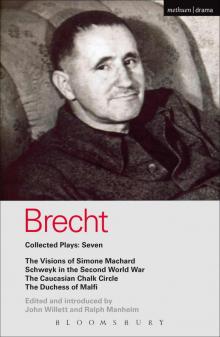 Bertolt Brecht: Mutter Courage und ihre Kinder 7
Bertolt Brecht: Mutter Courage und ihre Kinder 7 Bertolt Brecht
Bertolt Brecht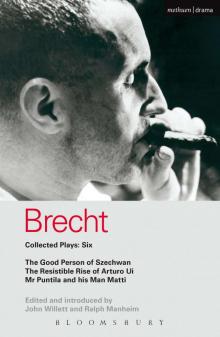 Bertolt Brecht: Mutter Courage und ihre Kinder 6
Bertolt Brecht: Mutter Courage und ihre Kinder 6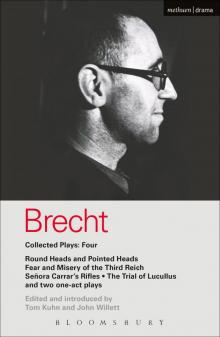 Bertolt Brecht: Mutter Courage und ihre Kinder 4
Bertolt Brecht: Mutter Courage und ihre Kinder 4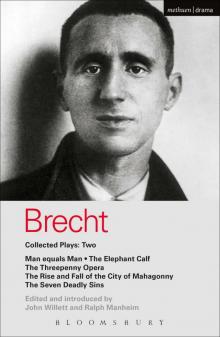 Bertolt Brecht: Mutter Courage und ihre Kinder 2
Bertolt Brecht: Mutter Courage und ihre Kinder 2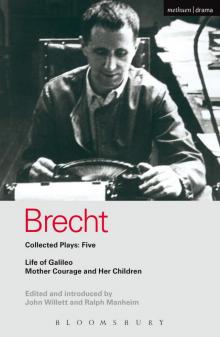 Bertolt Brecht: Mutter Courage und ihre Kinder 5
Bertolt Brecht: Mutter Courage und ihre Kinder 5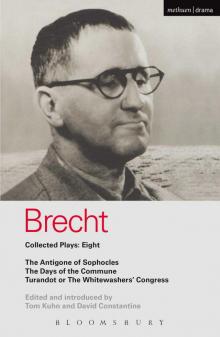 Collected Plays, Volume 4 (Bertolt Brecht: Plays, Poetry & Prose) 8
Collected Plays, Volume 4 (Bertolt Brecht: Plays, Poetry & Prose) 8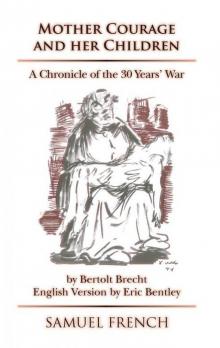 Mother Courage and Her Children
Mother Courage and Her Children Bertolt Brecht: Mutter Courage und ihre Kinder 1
Bertolt Brecht: Mutter Courage und ihre Kinder 1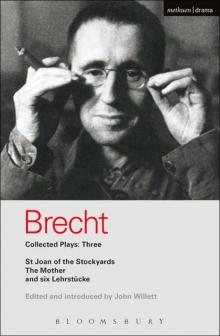 Brecht Collected Plays: 3: Lindbergh's Flight; The Baden-Baden Lesson on Consent; He Said Yes/He Said No; The Decision; The Mother; The Exception & the ... St Joan of the Stockyards (World Classics)
Brecht Collected Plays: 3: Lindbergh's Flight; The Baden-Baden Lesson on Consent; He Said Yes/He Said No; The Decision; The Mother; The Exception & the ... St Joan of the Stockyards (World Classics)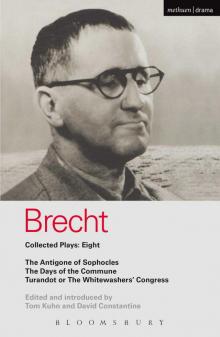 Brecht Plays 8: The Antigone of Sophocles; The Days of the Commune; Turandot or the Whitewasher's Congress: The Antigone of Sophocles , The Days of the Comm (World Classics)
Brecht Plays 8: The Antigone of Sophocles; The Days of the Commune; Turandot or the Whitewasher's Congress: The Antigone of Sophocles , The Days of the Comm (World Classics) Brecht Collected Plays: 1: Baal; Drums in the Night; In the Jungle of Cities; Life of Edward II of England; & 5 One Act Plays: Baal , Drums in the Night , In the Jungle of Ci (World Classics)
Brecht Collected Plays: 1: Baal; Drums in the Night; In the Jungle of Cities; Life of Edward II of England; & 5 One Act Plays: Baal , Drums in the Night , In the Jungle of Ci (World Classics)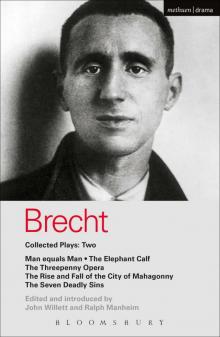 Brecht Collected Plays: 2: Man Equals Man; Elephant Calf; Threepenny Opera; Mahagonny; Seven Deadly Sins: Man Equals Man , Elephant Calf , Threepenny Ope (World Classics)
Brecht Collected Plays: 2: Man Equals Man; Elephant Calf; Threepenny Opera; Mahagonny; Seven Deadly Sins: Man Equals Man , Elephant Calf , Threepenny Ope (World Classics)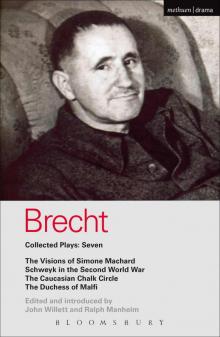 Brecht Collected Plays: 7: Visions of Simone Machard; Schweyk in the Second World War; Caucasian Chalk Circle; Duchess of Malfi (World Classics)
Brecht Collected Plays: 7: Visions of Simone Machard; Schweyk in the Second World War; Caucasian Chalk Circle; Duchess of Malfi (World Classics)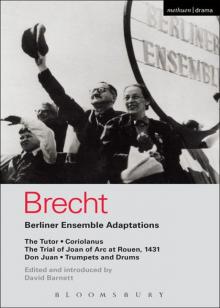 Berliner Ensemble Adaptations
Berliner Ensemble Adaptations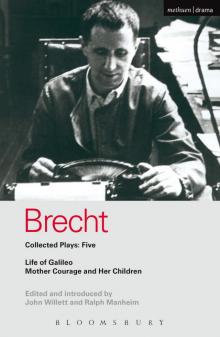 Brecht Collected Plays: 5: Life of Galileo; Mother Courage and Her Children (World Classics)
Brecht Collected Plays: 5: Life of Galileo; Mother Courage and Her Children (World Classics)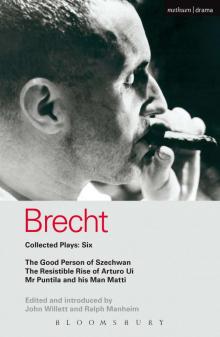 Brecht Collected Plays: 6: Good Person of Szechwan; The Resistible Rise of Arturo Ui; Mr Puntila and his Man Matti (World Classics)
Brecht Collected Plays: 6: Good Person of Szechwan; The Resistible Rise of Arturo Ui; Mr Puntila and his Man Matti (World Classics)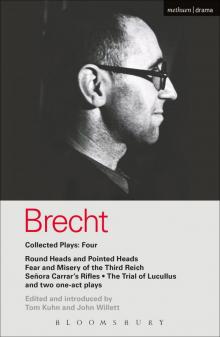 Brecht Collected Plays: 4: Round Heads & Pointed Heads; Fear & Misery of the Third Reich; Senora Carrar's Rifles; Trial of Lucullus; Dansen; How Much Is ... and Misery , Carr (World Classics)
Brecht Collected Plays: 4: Round Heads & Pointed Heads; Fear & Misery of the Third Reich; Senora Carrar's Rifles; Trial of Lucullus; Dansen; How Much Is ... and Misery , Carr (World Classics)